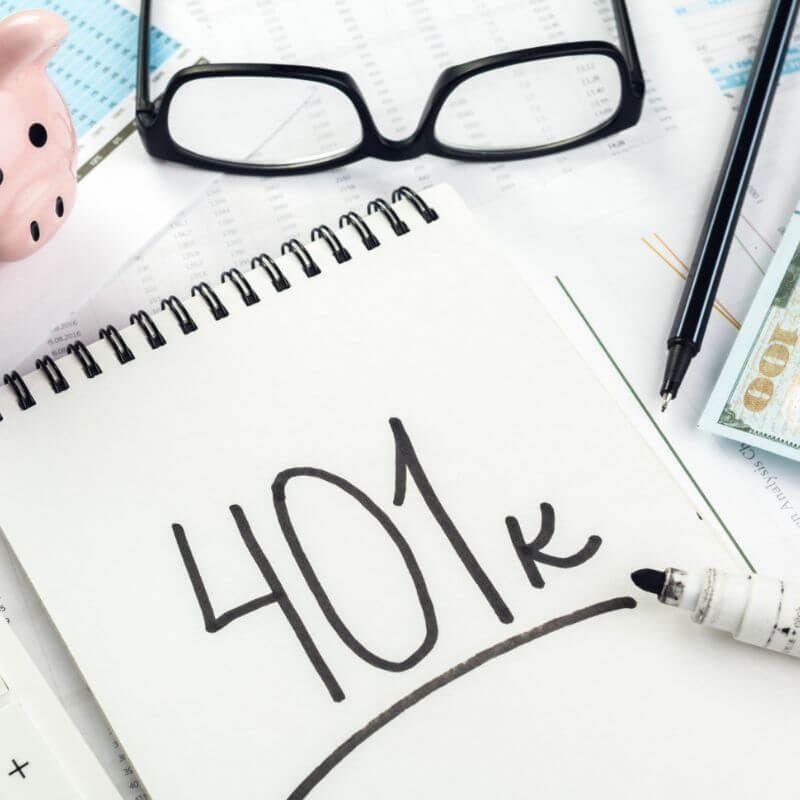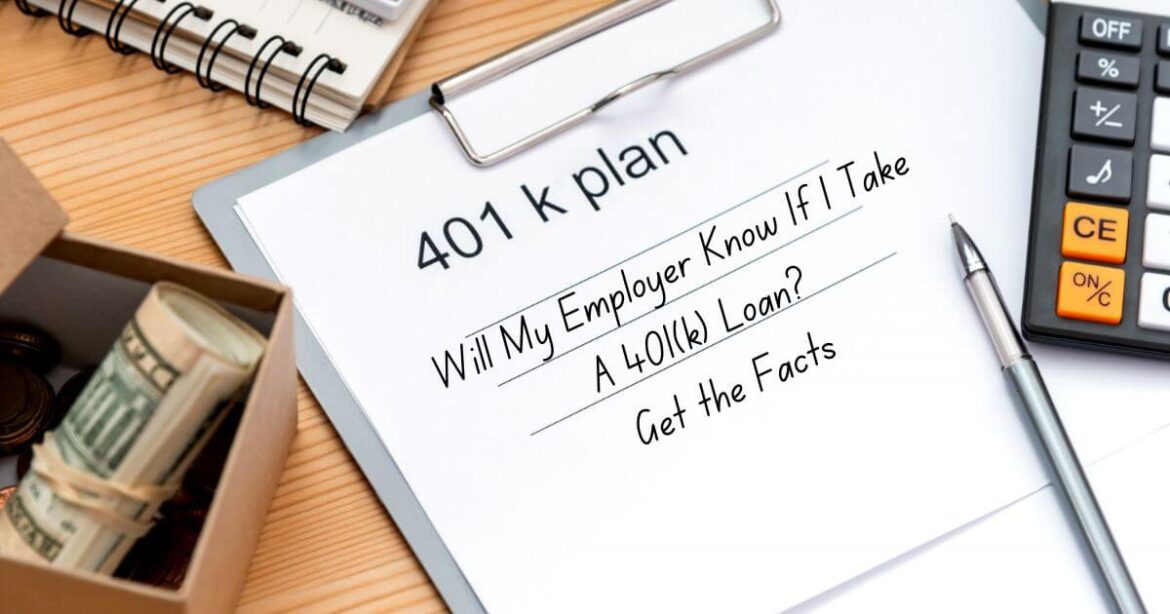Last Updated on July 14, 2025 by Amrita Das
Borrowing money from your 401(k) can be a great option for financial assistance, as it allows you to tap into your own retirement savings. However, many individuals are concerned about their privacy and wonder if their employer will know about their 401(k) loan.
While it is true that your employer will know about your loan, they are also obligated to respect your privacy. In this guide, I will discuss everything about taking out a 401k loan and its consequences where you will get your answer to the question of will my employer know If I take a 401k loan.

Read Also: What Is A Navy Federal Pledge Loan? Learn Step-By-Step
Understanding 401(k) Loans: What You Need To Know
When it comes to accessing funds from your retirement plan, 401(k) loans are a popular option. Unlike traditional loans, there is no credit check required or assessment of your credit history required.
This is because 401(k) loans are not technically considered loans, but rather the ability to tap into a portion of your own retirement savings. So how much can you borrow through a 401(k) loan? The amount depends on your vested balance and there are two options:
- The large of $10,000 or 50 percent of your vested account balance.
- A maximum limit of $50,000.
But it’s important to remember that the borrowed amount must be repaid under specific rules in order to maintain the original state of your 401(k) plan.
A significant benefit of a 401(k) loan is that the interest accrued on the borrowed amount is paid back into the participant’s own 401(k) account. In other words, it is essentially a repayment from oneself rather than an added expense or loss.
Overall, the impact of a 401(k) loan on your retirement savings can vary. It could have minimal effect, no effect at all, or even potentially improve your progress towards saving for retirement. In comparison to other types of loans with high interest rates, a 401(k) loan may be a more cost-effective option.
Will My Employer Know If I Take A 401(k) Loan?
One of the factors to consider when deciding whether or not to take out a loan from your employer-sponsored retirement plan is whether or not your employer will know about it. The answer to this question is yes – in most cases, your employer will be aware of any 401(k) loans you take out.
This is because you would need to go through the HR department for the loan request and they would also oversee the repayment process through payroll deductions. However, if you are concerned about confidentiality, you can ask HR to keep your loan request confidential.
It is important to note that loans from 401(k) plans are not guaranteed to be approved and your employer may not even offer this option. Therefore, it is crucial to carefully consider all factors before taking out a 401(k) loan.
Read More: Is Personal Loan Pro Legit? A Comprehensive Review
Your Colleagues And 401(k) Loan Information
It’s important to remember that while your employer has access to 401(k) records, this does not necessarily mean that your colleagues will have access to this information.
The details of your 401(k) plan are generally kept confidential and may not be available to specific colleagues within the company. However, it’s always best to check with your employer regarding their policies on confidentiality and who has access to 401(k) records.
Overall, it’s essential to maintain open communication with your employer regarding any loans or withdrawals from your 401(k) account. The more transparency there is between you and your employer, the smoother the process will be when considering a 401(k) loan.
When To Consider A 401(k) Loan?
There are various situations in life where you may find yourself facing unexpected financial needs. In such cases, borrowing from your 401(k) plan can be a viable option. However, although it can be the best choice for you, it is important to carefully consider this option.
One key factor to consider is the urgency and severity of the need for cash. If it is a serious short-term liquidity need and all other options have been exhausted, then borrowing from your 401(k) can be a smart financial decision.
This is especially true when compared to other high-interest loans such as title loans or payday loans. By taking out a 401(k) loan, you can save yourself from incurring heavy interest charges and protect your long-term savings.
However, it is important to remember that a 401(k) loan does come with some risks. If the loan limits and repayment rules are violated, it can result in tax implications and potentially impact your retirement savings progress.
Therefore, it is crucial to have a solid plan for repaying the loan on time. Furthermore, it is worth considering if there are alternative options available before resorting to a 401(k) loan.
Preemptive planning, setting financial goals, and committing to regular saving can help prevent the need for a 401(k) loan in the first place. Exploring other borrowing options such as a home equity line of credit (HELOC) can also be beneficial.
Understanding The Process Of Taking A 401(k) Loan
As you know, taking out a loan from your 401(k) can be a helpful option in times of financial need. However, it is important to understand the process and requirements before making decisions. Here are some key points for your considerations:
Eligibility
You can only take out a loan from an active 401(k) plan with your current employer. Your company has the authority to approve or deny your application, so it is important to check with your plan administrator for any specific rules and regulations.
Application Process
To apply for a 401(k) loan, you will need to contact your plan administrator and review the procedures. While some plans allow for online applications, it may take a few days or even weeks for the funds to be distributed.
Factors that may impact approval
Your credit score does not play a role in determining eligibility for a 401(k) loan. However, if you already have an outstanding loan from your 401(k), it may result in a denial.
Self-employed individuals
If you have a solo 401(k), you have the power to approve your own loan request. However, it is important to adhere to IRS guidelines and regulations. Note that not all solo 401(k) providers support loans, so it is best to confirm with your plan administrator beforehand.
Carefully consider before taking a loan
Taking a loan from your 401(k) should be considered as a last resort. It is important to understand the potential impact on your retirement savings and have a repayment plan in place.
How Long Does It Take For A 401(k) Loan To Be approved?

The approval timeline for a 401(k) loan can vary depending on your employer’s administrative processes and the specific requirements of your 401(k) plan.
Internal Processing Time
The initial step involves filling out the necessary loan application paperwork provided by your employer or plan administrator. The processing time for this paperwork typically varies but can take anywhere from a few days to a few weeks. This timeline may also depend on your employer’s internal processing efficiency.
Plan-Specific Rules
The approval timeline may be influenced by your employer’s specific 401(k) plan rules. Some plans might have additional requirements or steps to follow before a loan is approved. For example, they may require documentation of the intended use of the loan, such as for a home purchase or medical expenses.
Administrative Processes
Once your application is submitted, your employer’s HR department or plan administrator reviews and processes the loan request. They will verify your eligibility, ensure compliance with plan rules, and calculate the loan amount based on the plan’s provisions.
This administrative phase can take additional time, depending on the workload and efficiency of the department responsible for handling such requests.
Disbursement
After approval, the disbursement of the loan can vary further. Some employers may issue the funds quickly, while others may take a bit longer to process the disbursement, often in the form of a check or direct deposit.
How Do I Repay A 401k Loan After Leaving My Job?
Pay Off the full amount if possible
This is the simplest way to repay a 401(k) loan if you have the funds available. You can either take money from your current savings or investments or take out another loan to cover the balance of the 401(k) loan.
Roll Over Your Loan Balance into an IRA Account
You may be able to roll over your loan balance into an IRA account. This can help you avoid the taxes and penalties associated with defaulting on the loan, as long as it is done within 60 days of leaving your job.
Use a Balance Transfer Credit Card
You can set up a balance transfer on a credit card to pay back the loan quickly. Make sure that you are able to make the monthly payments on time in order to avoid any late fees or interest charges.
Take Out a Personal Loan
You may be able to take out a personal loan from a bank or credit union in order to pay off your 401(k) loan. Make sure that you are able to make the monthly payments on time in order to avoid any late fees or interest charges.
Contact Your Former Employer
Lastly, If you still have a good relationship with your former employer, you may be able to come up with an arrangement for repaying the loan. This can help you avoid taxes and penalties associated with defaulting on the loan.
How Does A 401k Loan Affect My Job?
Taking out a 401(k) loan may not directly affect your job, but it could have some consequences that indirectly impact your employment.
For example, if you take out a large loan or default on your payments, you may need to increase your contributions or delay retirement in order to make up for the lost funds and interest. This could affect your long-term financial goals and potentially impact your decision to stay with the company.
Additionally, if you leave your job while still repaying a 401(k) loan, the outstanding balance will become due immediately. If you are unable to pay it back, the remaining amount will be considered a distribution and may be subject to taxes and penalties.
Does A 401k Loan Affect My Credit Score?
The short answer is no, a 401k loan does not affect your credit score. Because this loan is taken from the funds you have saved in your retirement account. Therefore it is not reported to the credit bureaus and does not appear on your credit report.
While taking out a 401k loan in this case may reduce the amount of money you have saved for retirement, it will not appear on your credit report and will not affect your current credit score. However, you should keep in mind that missing payments on 401k loans will indirectly have a negative impact on your credit score.
Since you are borrowing money from your retirement account, the loan is technically considered a “loan.” If you fail to repay the loan on time, it may not bring benefits to you but may create additional financial problems. So, even though a 401k loan does not directly affect your credit score, it can play an indirect role on your credit score.
Do 401(k) Loans Affect Mortgage Applications?
When it comes to the question of whether or not 401(k) loans affect mortgage applications, the answer is generally no. While lenders may be aware that you have a 401(k) loan, they typically don’t count it as part of your debt-to-income ratio and therefore won’t weigh it heavily when evaluating your ability to repay a mortgage.
That being said, if you are already carrying a significant amount of debt or your monthly housing costs already account for 28% or more of your total income, then lenders may view a 401(k) loan as an additional risk factor when determining whether to approve your mortgage application.
Ultimately, the impact of a 401(k) loan on the success of your mortgage application will depend on a variety of factors, including the amount of your loan and any other debts you have.
401k Loan Vs Personal Loan
When comparing a 401(k) loan and a personal loan, you need to consider the pros and cons of both. However, let’s look at the 401k first, a 401(k) loan can be advantageous to you because you are basically paying the interest back to yourself instead of a lender and there is no credit check required.
However, if you fail to repay the loan, it may be considered a taxable withdrawal by the IRS and you may face tax penalties. On the other hand, personal loans offer an alternative to borrowing without affecting your retirement savings. You may qualify for lower interest rates with good credit.
However, with these loans, you will pay interest to a lender and some personal loans may also have origination fees or prepayment penalties. Also, sometimes you may be exposed to higher interest rates for having a lower credit score.
When deciding which loan is right for you, it’s important to consider the amount you borrow, how long it will take to pay it back, and the financial consequences of defaulting on the loan.
Both a 401(k) loan and a personal loan can provide access to funds when you need them, but it’s important to think about your long-term financial goals to make the best decision for your budget.
401k Loan Vs Withdrawal
Both have advantages and disadvantages, so it’s important to understand the difference between them before making a decision. A 401k loan allows participants to borrow money from their own retirement savings plan without having to pay taxes or penalties.
This can be a great way to get money quickly and without having to take on additional debt. However, you’ll need to make sure that you’re able to repay the loan within five years, otherwise, you may face penalties and/or taxes.
Also, taking out a 401k loan can reduce your overall portfolio balance, which could potentially reduce the amount of money you’ll have in retirement. On the other hand, taking a withdrawal from your 401k account is another option for accessing funds for retirement savings.
This allows you to withdraw money without repaying it or facing penalties and taxes. However, withdrawals are taxed as income and can trigger an early withdrawal penalty if taken before age 59 1/2.
Also, unlike loans, withdrawals reduce the amount of money in your retirement savings account and thus can affect the total value of your portfolio over time. So, which option is best for you? It really depends on why you need the money and how much you need to borrow.
If you only need a small amount of funds for a short period of time, taking out a 401k loan may be the better option due to the fact that you’ll be able to pay it back quickly and without having to face taxes or penalties. On the other hand, if you need a larger amount of money for a longer period of time, then a withdrawal may be your best choice.
Ultimately, it’s important to understand the pros and cons of each option before making a decision. Be sure to talk to a financial advisor if you have questions about either option.
The Benefits Of Taking Out A 401k Loan

Taking out a 401k loan can be beneficial in several ways and these are as follows:
Offer low costs
Most 401k plans charge a much lower interest rate than other loan types, which can save you money when you repay the loan. Plus, since the funds are taken from your retirement account instead of a traditional lender such as a bank or credit union, most of the time there are no extra fees associated with taking out the loan.
No credit check required
Unlike most other loans, taking out a 401k loan does not require a credit check. This means that even if you have bad credit, you can still access the funds without having to worry about lenders looking at your credit history.
No taxes or penalties
When you take out a 401k loan, there is any need to pay any taxes or penalties on the amount borrowed. This is because the money you borrow is taken from your own retirement savings, so it’s not considered taxable income.
Flexible repayment terms
Most 401k loan repayment terms are flexible and can be tailored to fit your budget. You can typically make payments on a monthly or quarterly basis, and there’s usually no prepayment penalty for paying off the loan early.
Access to funds quickly
When you take out a 401k loan, you typically receive the funds within a few days or weeks. This makes it easier to access money in an emergency, without having to wait for traditional loans to be approved and disbursed.
Protection from creditors
Another benefit of taking out a 401k loan is that the money in your retirement account is protected from creditors. This means that if you ever find yourself in financial difficulty, your retirement savings cannot be touched by creditors. Additionally, if you have to file for bankruptcy, your 401k loan balance can’t be included as part of your liabilities.
Drawbacks Of Taking Out A 401k Loans
Costs you money
Because you’re essentially borrowing from yourself, you will need to pay interest on the loan — usually at a rate of prime plus 1%. That may not seem like much, but it is still money that goes out of your pocket.
In addition, if you fail to pay back the loan in full and on time, you’ll be charged a 10% early withdrawal penalty. This is especially punishing for those who are already struggling financially.
Reduces your retirement savings
Taking out a loan from your 401k drastically reduces the amount of money you’ll have available in retirement. The money you borrow today must be repaid with interest, meaning that it will no longer be earning investment returns over the years it takes to repay the loan.
Damage to credit
As your 401k loan is not reported to the credit bureaus, it won’t help or hurt your credit score. However, if you don’t repay the loan on time, it will be treated as an early withdrawal and reported as income — which can lower your credit score. Furthermore, any subsequent withdrawals may also be reported to the credit bureaus and may have a negative impact.
Limits your investment options
When you take out a loan from your 401k, the money is no longer available to be invested — so you’ll miss out on any potential gains that could have been earned over time.
This means that if you’re unable to pay back the loan in full, you will end up with less money in retirement than you would have if you had invested the loan amount instead.
Reduces your employer match
401k plans often come with employer matching contributions, which means that for every dollar you contribute to your account, your employer will also contribute a certain amount (up to a maximum).
However, when you take out a loan from your 401k, you’ll be reducing the amount of money that can be matched. This means you’ll miss out on potential free money and could end up with less retirement savings than if you had left your money in the plan.
Risk associated with job loss
Many 401k plans require that any outstanding loans are repaid within a certain period of time if you leave your job. If you’re unable to do so, the loan will be treated as an early withdrawal and taxed accordingly.
This could put you in a difficult financial situation — particularly if you are already struggling financially and don’t have other sources of income.
Limited borrowing amount
401k loans usually cannot exceed 50% of the vested balance of your account — and in some cases, the maximum amount you can borrow is even lower. That means that if you need to borrow a larger amount, you’ll have to look for other sources of funding.
Possible tax penalties
If you don’t pay back your 401k loan on time, you may be subject to tax penalties and fines. In addition, the loan itself could end up being taxable if it isn’t paid back as scheduled.
Will My Employer Know If I Take A 401(k) Loan: FAQs

Q: Is a 401k loan better than credit card debt?
A: It depends on your individual situation, but in general, a 401k loan can be better than a credit card loan because the interest rate and repayment terms are usually more favorable and your interest amount is going back into your account. Additionally, with a 401k loan you can avoid expensive late fees and penalties associated with credit card debt.
Q: Are there any risks associated with taking a 401k loan?
A: Yes, One risk is that if you lose your job and don’t pay back the loan on time, you will be subject to an early withdrawal penalty and taxes on the outstanding balance. Additionally, since 401k loans are usually secured by the plan assets, if the market drops you may not have enough money to repay the loan.
Q: Can I take out multiple 401k loans?
A: Yes, or maybe Not. Generally, most plans allow participants to take out one loan at a time. However, it’s important to check with your plan provider to determine if you qualify for multiple loans.
Additionally, taking out multiple loans can increase the risk of not being able to repay them, so it’s important to consider other options before deciding to take out multiple loans.
Q: Can I use my 401k to pay off debt?
A: Yes, you can use a 401k loan to pay off debt, however, there may be better options available depending on your individual situation. If you are struggling with high interest credit card debt, doing a balance transfer to a lower-interest credit card or taking out a personal loan could be more cost effective options than taking a 401k loan.
Q: Can I withdraw 100% of my 401k?
A: After you reach 59 1/2 you can withdraw as much money as you want from your account. But you generally cannot withdraw 100% of your 401k balance before this age. Most plans have an early withdrawal penalty for withdrawals before age 59 1/2, and withdrawals are subject to income tax.
Learn More:
- What Is Conventional Rehab Loan? Read Step By Step
- Is Fast Loan Direct legit? A Detailed Review Guide
Will My Employer Know If I Take A 401(k) Loan? Conclusion
So, finally let me say again that your employer is always aware of your 401k loan since the 401k retirement savings account is managed by your employer. However, one last important point is that you must carefully consider 401(k) loans when you choose this type of loan, as they can affect your retirement savings and financial future.
Before taking such a loan, consult a financial advisor and understand all the terms and possible consequences well. Maintaining open communication with your employer about your financial needs can help you make well-informed decisions and find possible alternative solutions without affecting your retirement savings.
